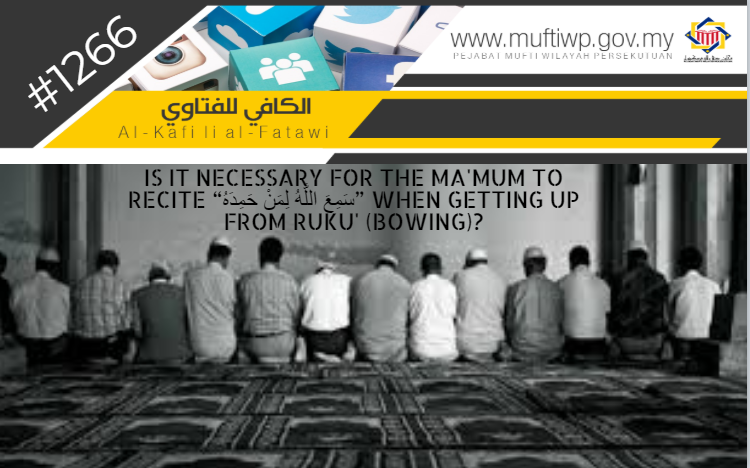
Question:
I once heard an ustaz teaching that for a ma’mum when he is getting up from ruku’ (bowing in prayer), that it is unnecessary for him to recite “سَمِعَ اللَّهُ لِمَنْ حَمِدَهُ” (tasmi’) and it is enough for him to recite “رَبَّنَا وَلَكَ الْحَمْدُ” (tahmid). However, what I’ve learnt since I was young is that a ma’mum should recite both of them. Can SS Mufti explain this?
Answer:
Alhamdulillah, praise and thanks to Allah for the countless blessings He has blessed us all with. Blessings and salutations to the Prophet Muhammad PBUH, his wives, his family, companions and all those that follow his teachings to the day of judgement.
Scholars have agreed that when one is praying alone then he should recite tasmi’ when he is getting up from ruku’ and tahmid when he is standing for i’tidal. Their consensus is stated by Imam al-Tahawi and Imam Ibnu Abd al-Barr. (Refer Syarh Ma’ani al-Athar 1/240 and Al-Istizkar 2/178)
However, scholars have differing opinions for ma’mum and imam. According to the final opinion of madhab Syafi’e, it is sunnah for the imam, ma’mum and those who are praying alone to recite “سَمِعَ اللَّهُ لِمَنْ حَمِدَهُ” when he is getting up from ruku’ and “رَبَّنَا وَلَكَ الْحَمْدُ” when he is standing straight for i’tidal. (Refer: Raudhah al-Tolibin 1/252)
This is supported by a hadith from Abu Hurairah RA who narrated:
كَانَ النَّبِيُّ صلى الله عليه وسلم إِذَا قَالَ: سَمِعَ اللَّهُ لِمَنْ حَمِدَهُ. قَالَ : اللَّهُمَّ رَبَّنَا وَلَكَ الْحَمْدُ
“When the Prophet (ﷺ) said, "Sami`a l-lahu liman hamidah," (Allah heard those who sent praises to Him), he would say, "Rabbana wa laka l-hamd."
Sahih al-Bukhari (795)
As for the majority of the scholars; which is madhab Hanafi, Maliki and Hanbali, ma’mum should just recite tahmid only without reciting tasmi’. (Refer: Al-Hawi li al-Fatawi 1/35)
Ibn al-Munzir state the opinion of Imam Syafi’e that state reciting both of them contradicts the consensus of scholars. However, Imam al-Ramli rejects this statement citing that it is also the opinion of Ata’, Ibn Sirin, Ishaq, Abu Burdah and others. (Refer: Nihayah al-Muhtaj 1/502)
The evidence presented by majority of the scholars is a hadith from Abu Hurairah RA who narrates that the Prophet PBUH said:
إِنَّمَا جُعِلَ الإِمَامُ لِيُؤْتَمَّ بِهِ فَإِذَا كَبَّرَ فَكَبِّرُوا وَإِذَا رَكَعَ فَارْكَعُوا وَإِذَا قَالَ سَمِعَ اللَّهُ لِمَنْ حَمِدَهُ . فَقُولُوا اللَّهُمَّ رَبَّنَا لَكَ الْحَمْدُ
The Imam is appointed to be followed. So, recite takbir when he recites it, and bow down when he bows down and when he utters:” Allah listens to him who praises Him,” say” O Allah, our Lord, for Thee be the praise.”
Sahih Muslim (417)
In another narration, the Prophet PBUH adds:
فَإِنَّهُ مَنْ وَافَقَ قَوْلُهُ قَوْلَ الْمَلاَئِكَةِ غُفِرَ لَهُ مَا تَقَدَّمَ مِنْ ذَنْبِهِ
“And if the saying of any one of you coincides with that of the angels, all his past sins will be forgiven.”
Sunan al-Tirmizi (267)
Regarding the above hadith, Syeikh Zakariyya al-Ansari said that reciting tasmi’ is understood by the companions of the Prophet PBUH, hence, the meaning of the hadith is: “When the imam recites tasmi’, then you should follow and recite tasmi’ as you already know and add tahmid.”. The Prophet PBUH asked the companions to recite tahmid because the Prophet PBUH would recite it in a low voice (sirr) and they would only hear the Prophet PBUH reciting tasmi’ loudly (jahar). (Refer: Asna al-Matolib 1/158)
Disposition and Conclusion
To conclude, we are of the same opinion as the opinion of madhab Syafi’e which states that it is sunnah for the imam, ma’mum and those who are praying alone to recite “سَمِعَ اللَّهُ لِمَنْ حَمِدَهُ” when getting up from ruku’ and “رَبَّنَا وَلَكَ الْحَمْدُ” when one is standing straight for i’tidal as stated in a hadith of the Prophet PBUH that was recorded in books written by scholars of madhab Syafi’e.
May Allah SWT bless us with the right understanding in performing the worship of prayer correctly. Islam is a tolerant and forgiving religion where there is space for discussion in branched issues when the difference of opinions is supported by evidences.
اللَّهُمَّ أَرِنَا الْحَقَّ حَقًّا، وَارْزُقْنَا اتِّبَاعَهُ، وَأَرِنَا الْبَاطِلَ بَاطِلًا، وَارْزُقْنَا اجْتنِاَبَهُ، وَلَا تَجْعَلْهُ مُلْتَبِسًا عَلَيْنَا فَنَضِلَّ، وَاجْعَلْنَا لِلْمُتَّقِينَ إِمَامًا
O Allah! show us the truth as true, and inspire us to follow it. Show us falsehood as falsehood, and inspire us to abstain from it and protect us from being led astray. And make our leaders from among those who have taqwa.